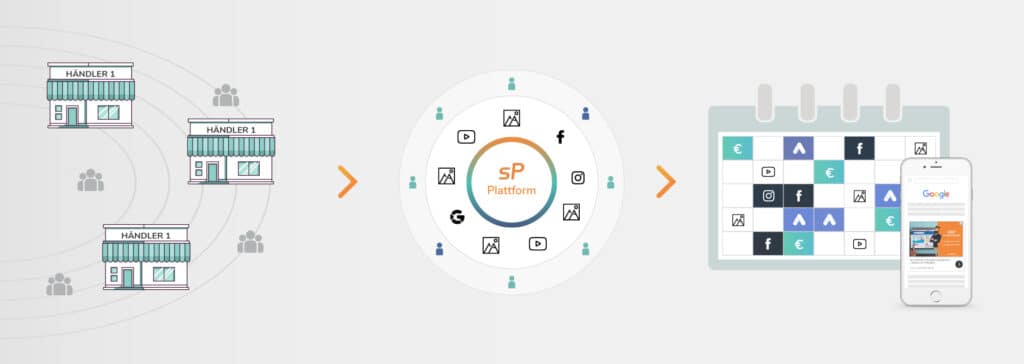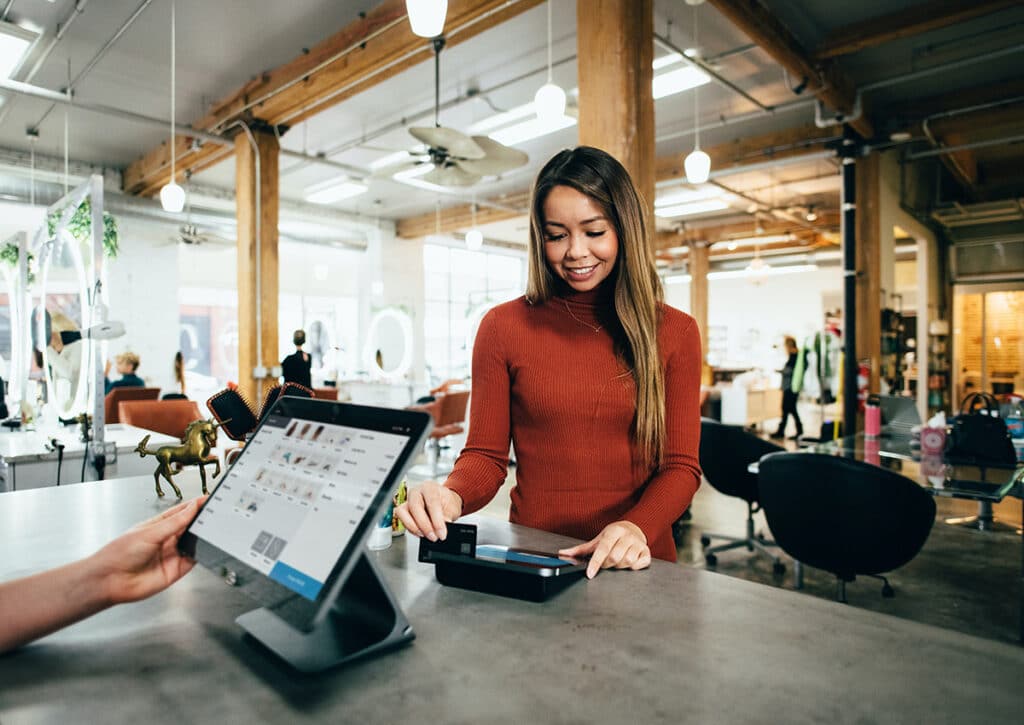The global health crisis was the last straw. More and more aspects of our lives have indeed been taking place on the Internet not only since Corona, but the pandemic has ultimately and clearly shifted the focus of our actions to the Internet also in our country. Everyone is online, regardless of age, origin, or social class. Whether out of deep conviction, out of sheer convenience or pure need – people inevitably live in two worlds. Online and offline can no longer be separated.
Performance, please!
A development that clearly did not go unnoticed by the advertising industry; and so the industry has been busy reallocating budgets for some time. Away from traditional to digital and toward digital formats. After all, there are good reasons for online marketing:
flexible budgeting
adressing specific target groups
great coverage and reach
high scalability
comprehensive success control
ongoing optimization
- flexible budgeting
- adressing specific target groups
- great coverage and reach
- high scalability
- comprehensive success control
- ongoing optimization
Once content has been produced, it can play on any number of channels in any number of versions and always reaches the target group at the right time in the right place. The interaction of the various channels in the customer journey is constantly analyzed, the channel mix and budget distribution are continuously optimized using real-time data.
David versus Goliath
For e-commerce giants with hundreds of marketing specialists and affiliated digital agencies, data-based targeting and context-related remarketing have long been part of daily business – it presents challenges for large parts of stationary retail. There is a lack of staff, time, money and sometimes the lack of an understanding of the necessity.
Above all, however, there is a lack of expertise to use digital instruments. The workaround usually consists of proven routines and acting with a clear conscience. Key accounts with online services remain the growth drivers. And so, the lockdown hit many SMEs like an avalanche.

The end of the corner shop?
But was it only the lockdown that broke the little corner stores’ necks? Even before Corona, only a third of them expected an increase in sales for the current financial year. The main reasons [given] are the huge range of online-only retailers and their aggressive pricing policy. Particularly popular in online shops are product categories where retail is traditionally well represented:
books
movies
music
video games
clothes
shoes
consumer electronics
- books
- movies
- music
- video games
- consumer electronics
- clothes
- shoes
The problem with this is that if you do don’t have the tools, you can’t really get your remaining service advantage out into the World Wide Web regardless of whether the ship door is open or not. Stationary retail has lost around 39,000 locations since 2010.
Who really benefits from the coop budget?
But this will not only become a problem for retailers themselves in the long run. Manufacturers and suppliers would also do well to seek effective, local advertising efforts and actively involve their dealer network in their marketing strategy. And not just in times of crisis, because only a healthy, diverse dealer portfolio ensures the sale of products and creates long-term customer loyalty away from the overwhelming power of marketplaces and price search engines.
Unfortunately, in the marketing mix of many brands, there is often no item that would support retailers. And when it does, it is often indifferently ticked off via the long-outdated coop budget. Quite understandably so – after all, dealer campaigns require an enormous amount of communication and coordination. Chapeau to anyone who can still keep track of the actual effect on brand image, conversion and product sales at the end of the season.
Who will save the SMEs?
Our socialPALS team has therefore made it its mission to save the (in)valuable world of retail from the threat of extinction. The socialPALS-platform connects manufacturers and suppliers with their respective dealer network, thus creating the missing link. The core idea of the 360° marketing is the use of all available communication channels – from the most far-reaching social networks to the Google Display Network. The integrated concept covers all phases of digital marketing – from the first idea to continuous success monitoring.

For the first time, brands and their dealers can use a sophisticated and easy-to-use tool to efficiently handle complex multi-channel campaigns, quickly and without prior knowledge. The brand’s message reaches its end customers in a CI-compliant, authentic and target-group-specific manner via the retailers’ social media channels in the local area and online via Google Display Ads.
Since the platform launch in 2018, the company, founded in Holzkirchen near Munich, has closed the gap between online and offline and is finally giving retailers the measures they urgently need to show new and existing customers how to get to the local store online. It is the long-awaited digital emergency aid for retailers – and thus their key to the gateway to the brave new world.
SocialPALS has already convinced many of the big players and now provides around 45 brands from a wide variety of industries with the daily drivers for automated retailer marketing. Almost 4,000 dealers have already registered on the platform and embarked on their promising journey into the online world.
Why not jump on the wave of solidarity emerging in recent months and turn the core of the crisis into the future of regional marketing? Why not show customers with an affinity for online what they used to appreciate about the corner shop?
competent advice
shopping experience
quick availability of goods
easy exchange
- competent advice
- shopping experience
- quick availability of goods
- easy exchange
Because digital and personal are not mutually exclusive. They form an unbeatable task force.





35 Responses
buy cipro ciprofloxacin 500mg buy online ciprofloxacin
https://cytotec.club/# cytotec buy online usa
buy cytotec: buy cytotec pills – buy cytotec
buy cytotec cytotec abortion pill buy cytotec online
http://cytotec.club/# buy cytotec pills
https://lisinopril.network/# lisinopril buy online
does tamoxifen cause weight loss: tamoxifen warning – tamoxifen vs clomid
cost of generic propecia without prescription cost cheap propecia without a prescription propecia generic
https://finasteride.store/# cheap propecia without rx
lisinopril 40 coupon lisinopril brand name canada lisinopril 5
nolvadex online: tamoxifen alternatives premenopausal – how to prevent hair loss while on tamoxifen
ciprofloxacin 500mg buy online cipro 500mg best prices antibiotics cipro
https://finasteride.store/# cost propecia
get cheap propecia without a prescription: get propecia no prescription – order cheap propecia prices
http://lisinopril.network/# zestril pill
ciprofloxacin order online cipro buy cipro online without prescription
http://ciprofloxacin.tech/# cipro 500mg best prices
cost cheap propecia pill: cheap propecia without a prescription – cost propecia price
lisinopril 5mg buy price of lisinopril in india lisinopril without prescription
https://cytotec.club/# order cytotec online
Cytotec 200mcg price: buy cytotec – Cytotec 200mcg price
tamoxifen generic tamoxifen estrogen nolvadex for sale amazon
http://lisinopril.network/# lisinopril 40 mg mexico
https://ciprofloxacin.tech/# buy generic ciprofloxacin
buy cipro online without prescription buy ciprofloxacin ciprofloxacin generic
cipro: buy cipro cheap – cipro pharmacy
how to prevent hair loss while on tamoxifen natural alternatives to tamoxifen alternatives to tamoxifen
http://nolvadex.life/# how to lose weight on tamoxifen
lisinopril discount: lisinopril 40 mg best price – lisinopril 12.5 20 g
mexico pharmacy: mexican pharmacy – mexico pharmacies prescription drugs
canada pharmacy 24h Prescription Drugs from Canada northwest pharmacy canada
http://mexicoph24.life/# medication from mexico pharmacy
mail order pharmacy india https://indiaph24.store/# indian pharmacy paypal
online shopping pharmacy india
1
Your article helped me a lot, is there any more related content? Thanks!